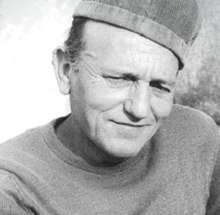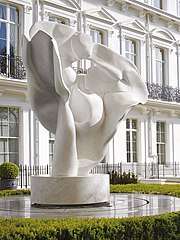Sem Ghelardini
Sem Ghelardini (30 March 1927 – 12 January 1997)[1] was an Italian sculptor and artisan. He was known as a master marble-carver and was the founder of Studio Sem in Pietrasanta which has executed the monumental works of many contemporary sculptors, including Henry Moore and Joan Miro. Helaine Blumenfeld and Harold F. Clayton are amongst the artists who learned marble carving at his studio. Ghelardini died in Pietrasanta, the city of his birth, at the age of 69. Studio Sem continues to the present day, directed by his former assistant and collaborator Keara McMartin and his youngest son Pierangelo Ghelardini.
Sem Ghelardini | |
|---|---|
 | |
| Born | Semme Ghelardini 30 March 1927 Pietrasanta, Italy |
| Died | 12 January 1997 (aged 69) Pietrasanta, Italy |
| Occupation | sculptor and artisan |
Life and career
Ghelardini was born in Pietrasanta, a town in the foothills of the Apuan Alps long known for its marble quarries and artisans working in marble. Michelangelo had been sent there in 1518 by Pope Leo X to source the marble for the façade of the Basilica of San Lorenzo.[2]
As a 15-year-old, Ghelardini became a prominent member of the Italian resistance movement in the region, working with the American forces who would drop off money to fund their activity.[3] After the war he studied at art schools in Massa and Florence and then returned to Pietrasanta where he trained as a marble sculptor with Dino Niccolai. When the firm they were working for went bankrupt in the early 1950s, Niccolai and Ghelardini opened their own studio specialising in the production of figurative statuary for churches and cemeteries. After Niccolai's retirement, Ghelardini carried on the firm which would later become known as Studio Sem. The business had thrived in the 1950s and early 1960s with clients from Italy and abroad. Amongst the works they executed during that time was a statue of the Madonna for Saint Patrick's Cathedral in New York and the restoration of a bust of Diana for the Versailles Museum.[1][2][4]
In 1963, the Second Vatican Council advocated a retrenchment in religious art and removed the requirement that all Catholic churches have a marble statue of the church's namesake. The decision nearly brought the firm to bankruptcy and saw the closure of many marble-carving and bronze-casting businesses in Pietrasanta.[2] However, Ghelardini was one of the first marble artisans in Italy to recognise the opportunities afforded by abstract sculpture and working with contemporary artists to help them realize the often monumental works which they had designed.[5][6] It was to become the mainstay of Studio Sem. From the early 1960s Henry Moore entrusted Ghelardini's studio with the execution of the majority of his stone sculptures.[7] Other artists for whom the studio had executed work in the 1960s and 1970s included Henri-Georges Adam, Emile Gilioli, Joan Miró, and Alicia Penalba.[1][8] Amongst the artists who later collaborated with the studio were Barry Flanagan and Knut Steen.[4]
Ghelardini also took a keen interest in young sculptors, training them in stone carving and inviting them to meet with the major artists who were visiting the studio to supervise the execution of their works. Sculptors who trained with Ghelardini include Helaine Blumenfeld and Harold F. Clayton.[3][2][9] In 2018, Blumenfeld described her first meeting with Ghelardini in 1974:

He was so charismatic. I immediately thought about Picasso because he had that same vitality.[3]
Following a series of strokes which began in 1996 and became progressively worse, Sem Ghelardini died in Pietrasanta on 12 January 1997 at the age of 69.[10] An exhibition by artists associated with his studio, entitled Omaggio a Sem: Se tutto va bene...siamo rovinati,[lower-alpha 1] took place in the town in the autumn of that year. In 2012, Piazza Sem Ghelardini in Pietrasanta was named in his honour.[1]
In the later years of his life, Ghelardini had acquired Il Feudo, a small farm in the hills outside Montignoso, and designed the vineyard's unique terracing system made from off-cuts of granite. The vineyard and its winery continue to be run by members of the Ghelardini family.[10]
Studio Sem after Ghelardini
Since Gelardini's death, Studio Sem has been run jointly by his former assistant and collaborator Keara McMartin and his youngest son Pierangelo who is also a marble carver.[10] The studio continues to specialise in the execution of works for contemporary sculptors including Helaine Blumenfeld, Damien Hirst and Peter Randall-Page but also produces classical and religious statuary.[1][6]
The Fondazione Sem, founded in 2003 and administered by McMartin and Pierangelo Ghelardini, has provided three-month residencies at the studio for emerging sculptors since 2006. The residency program is financed by the Brian Mercer Charitable Trust and was set up by Helaine Blumenfeld and the Royal British Society of Sculptors. Masters and Emerging Sculptors from Studio Sem, a major exhibition of 36 artists who had worked at the studio from the 1960s to the early 2000s, was held in the University of Leicester's Harold Martin Botanic Garden from July to September 2007.[2][11]
In 2016, the studio and its artists moved from the crowded historic center of Pietrasanta to more spacious premises in the nearby town of Camaiore.[12]
Notes
- In English: Homage to Sem: If everything goes well... we are ruined
References
- s.n. (4 September 2012). "Una piazza per Sem". La Gazzetta di Viareggio. Retrieved 10 September 2018 (in Italian).
- Gascoigne, Laura (3 July 2007). "The mastery of marble". The Times. Retrieved 10 September 2018 (subscription required for full access).
- Nandha, Tina (4 August 2018). "Flashback". The Daily Telegraph. Retrieved 10 September 2018.
- University of Leicester (21 June 2007). "Masters and Emerging Sculptors". Retrieved 10 September 2018.
- Berdondini, Pier Luigi (23 August 2017). "Gli artisti del marmo che col loro ingegno trasformano in realtà le idee degli scultori". La Repubblica. Retrieved 10 September 2018 (in Italian).
- Spence, Rachel (15 August 2009). "The drawing power of Pietrasanta's quarries". Financial Times. Retrieved 24 September 2018 (subscription required).
- Barassi, Sebastiano and Copper, James (2015). "Henry Moore and Stone: Methods and Materials". Tate Etc.. Retrieved 10 September 2018.
- Museo dei Bozzetti (2018). "Studio Sem e Scultori Associati". Retrieved 10 September 2018 (in Italian).
- Simnacher, Joe (28 May 2015). "Dallas artist Harold Fooshee Clayton dies at 61". The Dallas Morning News. Retrieved 10 September 2018.
- McMartin, Keara (21 February 2014). "The Beginning", Studio Sem. Retrieved 10 September 2018.
- McMartin, Keara and Blumenfeld, Helaine (2015). "Mary Bourne Residency in Pietrasanta, Italy 2015". Brian Mercer Charitable Trust. Retrieved 11 September 2018.
- Basile, Luca (26 January 2016). "Lo Studio Sem chiude il laboratorio e trasloca a Camaiore". Il Tirreno. Retrieved 11 September 2018 (in Italian).
Further reading
- McMartin, Keara (1997). Omaggio a Sem: Se tutto va bene...siamo rovinati (exhibition catalog). Comune Di Pietrasanta Assessorato alla Cultura (in Italian and English)
External links
- Studio Sem (official website)
- Video: A Day at Studio Sem, a 17-minute film chronicling the work of the artists and artisans at Studio Sem over the course of a single day, 16 October 2006 (official YouTube channel of Studio Sem)